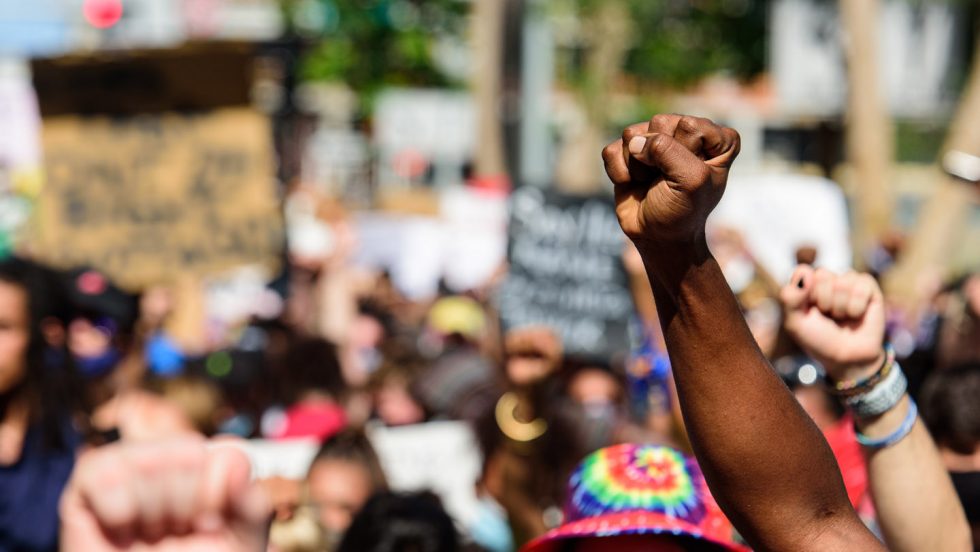
On January 6, 2021, when thousands of violent rioters launched an attack on the United States Capitol in Washington, D.C., there was much more at stake than the presidential election results the insurgents sought to impede.
While televisions, computer screens and mobile devices were alight with mind-blowing images of a frenzied, armed mob, scholars of civil rights in America saw a bloody, raging symptom of something much larger.
Marsha J. Tyson Darling, PhD, professor of history and interdisciplinary studies and director of Adelphi’s African, Black and Caribbean Studies program, offers a deep and insightful look at the problem and its solution in a scholarly article titled “Reclaiming Democracy in the Twenty-First Century: A Challenge.” The article was recently included in the edited collection People Power: History, Organizing, and Larry Goodwyn’s Democratic Vision in the Twenty-First Century, to be published in July by University Press of Florida.
Dr. Darling explores and explains the impact of massive amounts of dark money on American democracy, with those funds being channeled into politics by nonprofit organizations that are not required to disclose their donors. This practice enables large corporations and wealthy individuals to secretly influence public policy in favor of their interests.
“As the saying goes, democracy withers in the dark,” Dr. Darling said. “As we proceed into the third decade of what is already a tumultuous century, we must counter the odious economic, political, cultural and racial backlash that has been unleashed on our institutions and many peoples.”
In “Reclaiming Democracy in the Twenty-First Century,” Dr. Darling traces the roots of American civil rights and the hard-won gains achieved by well-organized, impassioned activism.
“Coalition building and rights-based identity movements promoted causes including worker rights, civil rights, women’s reproductive liberty and the exercise of human rights by BIPOC [Black, Indigenous and people of color], the poor, the elderly and the differently abled. Direct action protest, legal battles, intergenerational organizing and other tactics were used to win civil rights, collective bargaining rights, fairer housing laws and other progressive social changes that moved society in the direction of greater liberty and equality for all.In the 21st century, all of these fragile gains are in grave jeopardy” due to tyrannical efforts based in fear-mongering and falsehoods.
In a fascinating narrative woven around historic milestones, including the rise of capitalism, which shifted economic power to the wealthy; the New Deal, which sought to stabilize the economy and ameliorate gross social inequities following the Great Depression of the 1930s; the 1940 launch of the National Association for the Advancement of Colored People (NAACP) Legal Defense Fund, which established legal strategies to challenge discrimination in housing, education, the workplace and other arenas of American life; and the Civil Rights Act of 1964, Dr. Darling describes the essential role of activism and legal action in seeking social equity across populations in the United States.
“Today, however, all of these gains are under attack,” writes Dr. Darling, as powerful economic and political forces, supported by scores of misinformed Americans, threaten to undermine these hard-won, yet incomplete, gains.
Reclaiming What Matters
Among the keys to gaining back, protecting and advancing the progress of the last century are the rededication and escalation of efforts to protect voters’ rights, drive voter turnout and strengthen the Voting Rights Act of 1965. There is legislation before Congress (H.R. 885-the Voting Rights Amendment Act) which would strengthen the act and restore federal oversight of election systems.
In addition, continued lawsuits brought by organizations and individuals directly affected by voter suppression are essential. Dr. Darling also recommends getting involved with the movement to abolish the Electoral College voting system and supporting the National Popular Vote Interstate Compact (NPV), through which 15 states and Washington, D.C., have already pledged to allot their electoral votes to the winner of the popular vote.
For all advocates of social justice, it is vital to stay informed with knowledge gained from legitimate sources and to talk with family, friends, neighbors and co-workers about the issues of oppression and discrimination that plague our nation. Form or join informal networks of activists or work in your community with influential institutions like houses of worship to provide information and promote voter registration and voter turnout.
The very nature of our democracy bestows on all Americans the right to have a voice in the governing of our nation. No one among us should squander that opportunity at the great peril of others and social justice.col